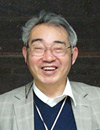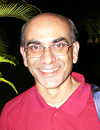 |
|||||||||||
|
|||||||||||
|
|||||||||||
|
Shin-ichi Kurokawa works actively as Chair of the International Linear Collider Steering Committee (ILCSC), which together with ICFA has created and is overseeing activities of the Global Design Effort. But he also has another face: For more than ten years now, he has been building a closer relationship between accelerators within Asia. His concern is not only for the electron machines but also for proton machines, synchrotron radiation facilities, and eventually, neutron scattering facilities in Asian countries. Collaborating with accelerator physicists and engineers across Asia, Kurokawa has visited certain countries more than a hundred times. He has served on the Asian Committee for Future Accelerators (ACFA) since it was founded in 1996 and is current chair of the committee. Kurokawa is instrumental in establishing APAC, the Asian Particle Accelerator Conference under the auspice of ACFA. His effort has been rewarded in Core University Collaboration program of the Japan Society for Promotion of Science (JSPS) in 2000, when his proposal was officially accepted to start a collaboration on accelerator sciences between China and Japan. In April 2005, this JSPS program expanded to include Korea. Under an agreement signed between Indian DST and Japanese JSPS on March 11, India will also join the Core University Collaboration program this April. "Under JSPS and DST framework, RRCAT and KEK are now trying to sign a MoU for collaboration in accelerator science," says Satish Joshi, one of the proposed coordinators of the Core University Collaboration program at RRCAT. "RRCAT will act as a core institute from India to identify the areas of interest among the accelerator sciences and try to identify some projects of mutual interest to India as well as to Japan." The funding agencies involved in this Core University Collaboration program are: CAS in China, KOSEF in Korea, DST in India and JSPS in Japan. Core institutes in each country are: IHEP in China, PAL in Korea, RRCAT in India and KEK in Japan. Under this program exchanges between physicists and engineers, joint research, and joint seminars are performed especially to train and educate younger researchers in Asia. “It is important to strengthen the activities of accelerator sciences in the Asian region," Kurokawa says. "Our collaborations are not only for the ILC. We would like to establish strong ties between Asian countries in every field of the accelerator sciences, covering high-energy physics, accelerator physics, synchrotron-radiation and spallation neutron sciences." Amit Roy, the director of the Interuniversity Accelerator Centre in Delhi, believes that recruiting a new generation of scientists is a very important part of Kurokawa’s efforts. "Japan already has the programme J-PARC," he says. "Most of the technologies developed there could be used for the spallation neutron sources, for example. We would like to bring new students so that they get motivated to work new challenging area of physics. We will be sending students to the SOKENDAI school. With this new agreement, we expect our activities would expand much much larger." Kurokawa makes a point to include all Asian countries in this initiative, even those whose science programs are less developed. "In China, Taiwan, Korea, India and Japan accelerator sciences have been developed and collaboration among these are important and should be further strengthened," he says. "It is also of great importance to start collaboration with Asian countries that have good potentialities but accelerator sciences in which have less developed, such as Vietnam, Thailand, the Philippines, Pakistan, Bangladesh, Indonesia and Australia. To exploit potentialities of Asian countries in accelerator sciences is one of the most important jobs of ACFA." India’s recent signing of the agreement is a sign that Kurokawa’s hard work is worth it. "India is getting up," Joshi says. "We now have Indus-II coming up. After the commissioning of Indus-II and successful participation in the LHC, we are confident about taking part in the global programme. I'm sure it would help us bring up the accelerator community in India, so that the Indian scientists and Indian engineers also get exposed to the global programme." -- Youhei Morita |
|||||||||||
| © International Linear Collider |


